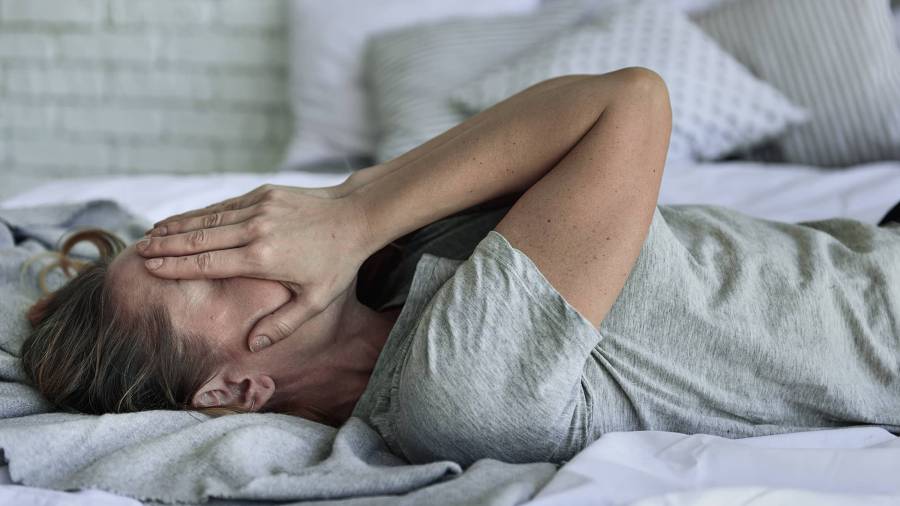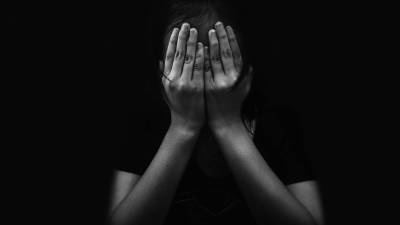Hypnosis for Anticipatory Anxiety
Overcoming The Fear of Fear
Learn on this page about treatment with hypnosis for fear of expectation, the fear and before the fear. Our experience shows that it often takes only a few sessions to let go of fears and free yourself up for life again. Hypnosis helps to uncover and work on the causes. Because in themselves, symptoms of anxiety, the physical signs are completely natural and normal. Often anxiety is exacerbated by stress and other factors. If the anticipatory anxiety - the fear of anxiety - is great, the more closely the body is observed and analyzed, and the more likely it is that the anxiety will actually become even greater.

Image: Hypnosis for Anticipatory Anxiety - Overcoming The Fear of Fear
Expectation anxiety symptoms
How to recognize expectation anxiety
To be more precise, anticipatory anxiety is a phobia called phobophobia. It is accompanied by a whole range of different symptoms that can manifest themselves psychologically and also on a physical level. The term phobophobia describes the feeling of "fear of fear", which causes people to withdraw further and further from life and normal everyday situations become increasingly difficult. Fear results in increased observation and perception of one's own body. It becomes difficult when fears expand in everyday life and an expectation of new fears arises. The fear of fear. This fear can become so great that normal everyday life is difficult and those affected withdraw more and more and begin to avoid situations that could be anxiety-provoking. The so-called anticipatory anxiety, the fear that the anxiety will occur again in a certain situation, intensifies the focus on the situation. Heartbeat and pulse are more accurately perceived and what is feared occurs. What results is a cycle.
The fear of expectation shows itself in people through different symptoms and bodily reactions on a physical and psychological level:
The fear of expectation shows itself in people through different symptoms and bodily reactions on a physical and psychological level:
Physical Symptoms
There are usually physical symptoms such as palpitations, high blood pressure, tension, cramping, dizziness, nausea, sweating, diarrhea and urination may occur. Shallow breathing that may progress to shortness of breath and feelings of suffocation. The body reacts with feelings of anxiety without the affected person being in the anxiety-provoking situation. Anxiety can escalate to panic attack.
Psychological Symptoms
Psychologically, anticipatory anxiety manifests itself through worryful brooding and negative thought spirals and thought carousels. These thoughts and worries often relate to dying in a certain situation, fainting, losing one's mind, or going crazy; they may also relate to fear of illness. The stress may be manifested by insecurity and a diminishing self-confidence. Affected individuals often feel helpless and unable to do anything about the situation. Depressive moods, depression, burnout and exhaustion can be observed.
Anticipatory anxiety and other anxiety disorders
Anticipatory anxiety, the fear of anxiety, should not be underestimated because it often accompanies or maintains other fears: generalized anxiety disorder, panic disorder, agoraphobia, specific phobias, or social phobia. Therefore, it not infrequently co-occurs with symptoms of other anxiety disorders. It manifests as a fear of moments of panic feelings. In fact, it is often the case that phobophobia does not occur as a single fear, but in combination, which does not make it easy to differentiate in diagnosis.
Expectation anxiety self test
Do I suffer from phobophobia?
The following questions may be initial clues as to whether you suffer from phobophobia:
-
1
Do you have feelings of anxiety when you think about certain situations because you are afraid that you might feel increased fear or panic in that situation? -
2
Do you experience any of the following symptoms: increase in heart rate and palpitations, sweating, trembling, and dry mouth. -
3
Even before a real situation, are you already experiencing strong feelings of anxiety? -
4
Do you encounter conflict at work or in your personal life because you have to cancel appointments due to worries about not feeling well there? -
5
Do you have the impression that you regularly avoid certain situations because you are worried that they could lead to feelings of anxiety?
If you can answer yes to any of these questions and feel restricted in your daily life and living, you should seek medical or therapeutic advice. You may have a panic disorder. Please note that questions are always asked broadly, so it is possible that people who are not affected by phobophobia may get a positive result. Not everyone who frequently cancels an appointment for personal reasons suffers from phobophobia.
Expectation anxiety facts
Fear of expectation - technical term phobophobia
The term phobophobia refers to the fear of anxiety. The fear of suffering one of the feared fear reactions. Hypnosis Berlin can also help you with phobophobia. It is the logical consequence of a spiral, which started with the first panic attack, can lead very slowly into the valley of fears. Over time, we no longer fear only the object, but also the fear of it. We no longer go to the basement because we might encounter a spider there and it might trigger an anxiety attack. So we no longer suffer from mere arachnophobia, now we suffer from fear of fear, anticipatory fear.
The fear of the next fear and feelings of panic
Expectation anxiety can be used to describe a permanent insecurity and anxiousness that refers to a possible recurring panic. There is a constant fear of having to experience panic feelings again, which leads people to avoid certain places or situations if they have already experienced fear and panic there.
25 %
of all people suffer from an anxiety disorder at least once in their lives.
of all people suffer from an anxiety disorder at least once in their lives.
5.7 %
indicate feelings of anxiety.
indicate feelings of anxiety.
6.1 %
indicate a panic disorder.
indicate a panic disorder.
Source Statista:
Own illustration, data source: https://de.statista.com Question/title: proportion of population with anxiety disorders (lifetime prevalence), source expert(s) (Kessler), survey by expert(s) (Kessler), Published by Focus, source reference Focus 14/2011, 04.04.2011, page 86, publication date April 2011, accessed 11/13/20
Own illustration, data source: https://de.statista.com Question/title: proportion of population with anxiety disorders (lifetime prevalence), source expert(s) (Kessler), survey by expert(s) (Kessler), Published by Focus, source reference Focus 14/2011, 04.04.2011, page 86, publication date April 2011, accessed 11/13/20
Expectation anxiety causes
Causes of phobophobia
Along with depression, anxiety is one of the most common mental illnesses. Women suffer from it twice as often. Causes are often that ordinary physical symptoms are evaluated as dangerous such as palpitations or dizziness. Affected persons relate this to the danger of a heart attack or an imminent fainting. In this evaluation, a negative cycle is created, which is further fueled by new anticipatory anxiety and soon leads to avoidance behavior. Affected persons experience themselves as helpless and have more and more experiences that confirm their fear of expectation and thus consolidate it.
Expectation anxiety consequences
What consequences can expectation anxiety have?
Often the fear of expectation leads to avoidance behavior, the fear reaches a pathological level. Life becomes more and more restricted, the "movement" radius becomes smaller and smaller, and even the thought of the next flight, spider or exam triggers feelings of anxiety. The very idea of the situation is often enough to cause this. To prevent family members from perpetuating this cycle of anticipatory anxiety and avoidance behaviors through their support, it is important to seek professional help early on.
Summarize the consequences of expectation anxiety as follows:
Summarize the consequences of expectation anxiety as follows:
- Feelings of shame, lower self-esteem and decreasing self-confidence
- Avoidance of situations and increased withdrawal into one's own four walls up to social isolation
- Higher risk of also suffering from depression
- Risk of developing addictions through "self-therapy or self-medication
- Problems in the professional environment up to loss of work
- Difficulties in relationships and partnership
Expectation anxiety and secondary conditions
Ongoing anticipatory anxiety can increase feelings of shame and often leads to lower self-esteem and self-confidence. Affected people trust themselves less and less and avoid situations more and more and withdraw. They have a higher risk of developing depression or developing addictions through "self-therapy or self-medication".
Expectation anxiety hypnosis treatment
Treat phobophobia with hypnosis
Hypnosis is the best means to dissolve phobophobia. It also speaks the language of images and knows how to combine the concrete and the abstract. It deals with the archetypes, connects to deep inner knowledge and mobilizes the self-healing powers of your subconscious. Hypnosis Berlin pokes their primal fear in the limbic system, exactly where it originates. Together we will decode the phobic images, perceive the fear and transform it by means of new imagery.In the end, you will be able to clearly recognize the important, the warning aspects of your fear again, while the phobia has disappeared.
More Information
Hypnosis Appointment Booking
The first hypnosis session usually lasts 120 minutes and includes getting to know each other, a detailed anamnesis and your first hypnosis.
After booking an appointment in the online calendar, you will receive detailed information about your hypnosis session by email and will receive the hypnosis e-book free of charge when you book the first session. Follow-up appointments usually last 90 - 120 minutes, depending on the current situation and the resulting needs.
You can find detailed information about the prices under Hypnosis Prices.
After booking an appointment in the online calendar, you will receive detailed information about your hypnosis session by email and will receive the hypnosis e-book free of charge when you book the first session. Follow-up appointments usually last 90 - 120 minutes, depending on the current situation and the resulting needs.
You can find detailed information about the prices under Hypnosis Prices.
Smaller topics and issues can sometimes be solved in one session. In particular, hypnosis for smoking cessation takes place in one intensive session. More complex issues that accompany people longer are treated in four sessions on average. Hypnotherapy is to be understood as a short therapy. There are also exceptions where I support clients over several years at their express request.
Usually clients come for a follow-up appointment at an interval of 1 to 4 weeks. I have had very good experiences with a session interval of 1 to 2 weeks. I would like to emphasize here that in my experience this depends on the topic and the client.
Under the following link you can select and book your appointment yourself in the online calendar: Make an Appointment.
You will receive an invoice for each session. This does NOT show any fee codes of the GebüH and does not contain any diagnoses. The session is to be paid privately at the end of the session in cash or with EC card. The practice does NOT bill public and private insurances.
You can find more questions and answers in the
Hypnosis FAQ section - frequently asked questions about hypnosis.
Frequently asked Questions
How can I tell if I was in trance?
Many people who have experienced hypnosis and trance describe the state as one that is similar to the feeling just be...
What are the advantages of Hypnosis Berlin?
These are the advantages of hypnotherapy at our Hypnosis Berlin Practice
The advantages of hypnosis are numerous. T...
How effective is hypnosis and are the effects long-lasting?
Is hypnosis effective in the long term or do the old behavior patterns come back?
Hypnosis is a highly effective tre...
How fast does hypnosis show its effects?
How quickly does hypnosis show an effect?
Hypnosis refers to communicating with the unconscious parts of the human b...
Similar Hypnosis Topics:
You can find more information about hypnosis and our hypnotherapy sessions in the FAQ section and more specifics about the hypnotherapy procedure here.
 Children
Children Phobias
Phobias Physical
Physical Profession
Profession Psychosomatic
Psychosomatic Relationship
Relationship Self-Growth
Self-Growth Stress
Stress





